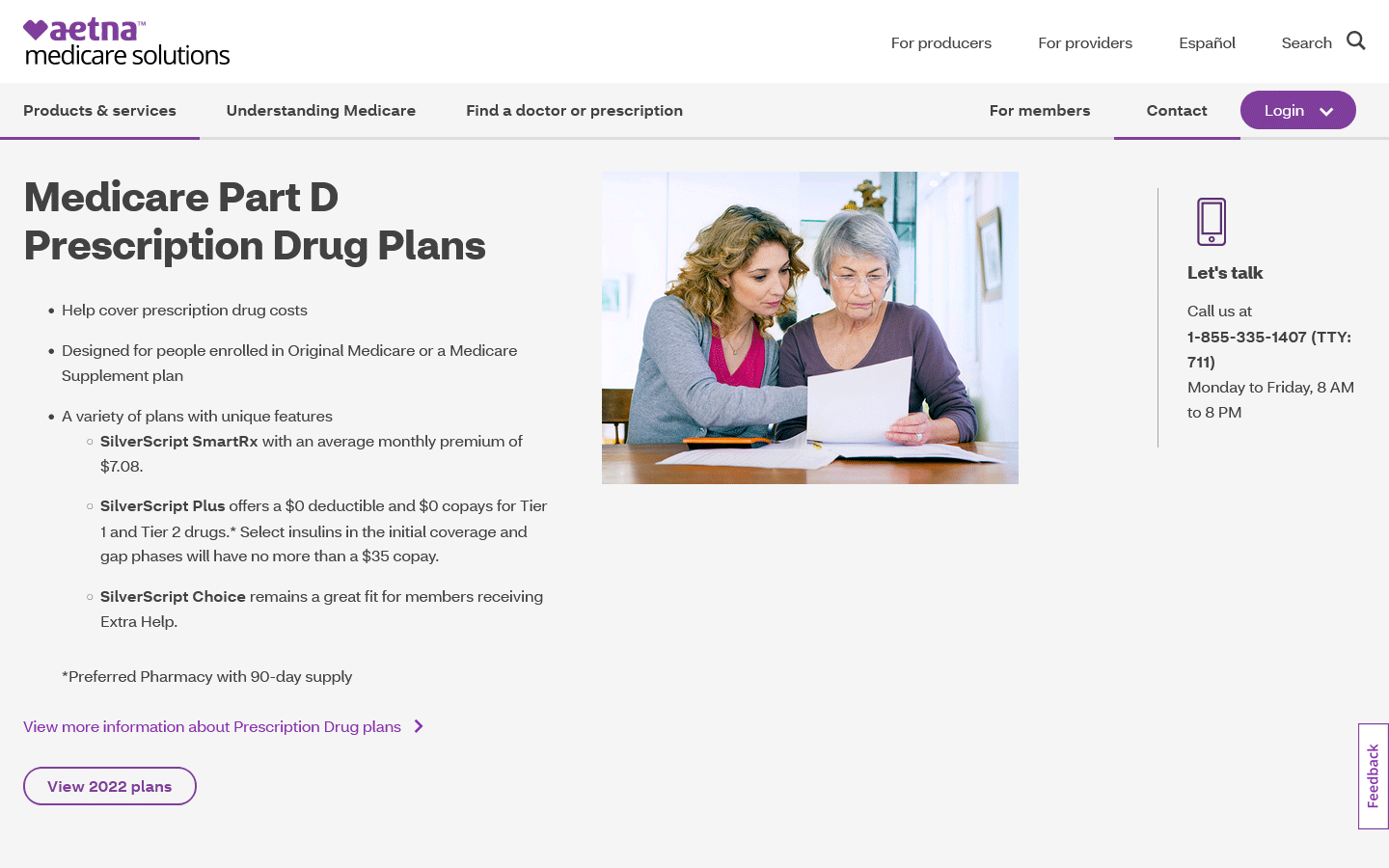Aetna Medicare Part D Prescription Drug Plans (PDPs) Review
Find out if Aetna Medicare Part D Prescription Drug Plans (PDPs) meet your needs.

Quick Aetna Medicare Part D Prescription Drug Plans (PDPs) review
 |
Aetna offers three different standalone Medicare Part D prescription drug plans (PDPs). All three plans have a 3.5 out of 5-star rating from the Centers for Medicare and Medicaid Services (CMS). |
| Medicare rating: 3.5 stars | A.M. Best financial strength rating: A | BBB rating: A+ | NCQA rating: 2.5 to 4.5 stars | Consumer Affairs rating: 3.4 | J.D. Power ranking: 7th out of 10 |
Aetna health insurance company has a long history dating back to 1853. Aetna has sold PDPs to Medicare enrollees since CMS approved Medicare Part D as an optional drug benefit in 2006. In 2018, Aetna was acquired by CVS Health Corporation and currently offers PDPs in all 50 states and Washington, D.C.
Aetna provides drug coverage through their Medicare Advantage Plans in addition to their PDPs, and some of the ratings and reviews here include Advantage plans or the parent company, CVS. PDP plans are rated separately by CMS only. This article looks specifically at Aetna’s PDP plans which are intended to supplement Original Medicare or certain Medicare Advantage Plans (PFFS or MSAs) that don’t offer drug coverage.
What Do Aetna Medicare Part D Prescription Drug Plans (PDPs) Cover?
Aetna Medicare Part D prescription drug plans are regulated by Medicare and must cover:
- A wide range of prescription drugs that people with Medicare take, including generic options
- Medication Therapy Management (MTM) programs for complex health needs
Aetna, like all Medicare Part D prescription plan providers, has a formulary (list of drugs) and separates drugs into tiers that correspond to costs. Lower tiers include generic, lower-cost medications, and higher tiers include higher-cost, brand name, or specialty drugs.
Aetna’s SilverScript Plus RX standalone Part D plan is the only plan that participates in the senior savings model that offers savings on insulin. These plans provide affordable copayments on select insulins, and you pay no more than $35 for a month’s supply.
Aetna has a broad network of participating preferred pharmacies, including Walmart, Costco, King Soopers, Safeway, and CVS. All plans include a zero deductible and a zero or $1 copay for tier one generic drugs from preferred pharmacies. When you search for a standalone Part D Plan, check to see if your preferred pharmacy is in-network and whether the formulary includes the drugs you take.

What Are Aetna’s Medicare Part D Prescription Drug Plan (PDP) Options?
Aetna offers three PDPs. All plans have the same initial coverage limit (what you and your plan spend before you enter the coverage gap), and the same annual out-of-pocket threshold amount (when you enter the catastrophic coverage phase). The SilverScript Plus plan includes gap coverage for Tier one and two drugs
- SilverScript SmartRx – Includes a wide selection of generic drugs for a low monthly premium ($7.08 on average). Tier one drugs are available with a $0 deductible and $1 copay at preferred pharmacies.
- SilverScript Choice – A good choice if you qualify for Extra Help. Includes a wide selection of generic and brand-name drugs. Tier one and two drugs are available with a $0 deductible.
- SilverScript Plus – Most comprehensive plan (and highest monthly premium) that includes:
- more Tier one and two drugs,
- $0 deductible for all tiers,
- $0 copays for Tier one and two drugs for a 90-day supply from preferred pharmacies,
- Tier one and two gap coverage,
- $35 copays for select insulins (Senior Savings Model), and
- extras such as prescription vitamins and erectile dysfunction drugs.
Compare costs for the three 2023 plans in Denver County, CO:
| Plan name | Monthly premium | Annual deductible | Initial Coverage Limit | Annual out-of-pocket threshold amount |
|---|---|---|---|---|
| SilverScript Smart RX (PDP) | $7.60 | $480 (tiers 2, 3, 4, 5) | $4,430 | $7,050 |
| SilverScript Choice (PDP) | $35.40 | $480 (tiers 3, 4, 5) | $4,430 | $7,050 |
| SilverScript Plus (PDP) | $85.30 | $0 | $4,430 | $7,050 |
*Based on pricing in Denver County, CO
Pros and Cons of Aetna Medicare Part D Plans
| What we like about Aetna Medicare Part D Plans: | The drawbacks of Aetna Medicare Part D Plans: |
|---|---|
|
|
Aetna Medicare Part D Plans Reviews and Ratings
Aetna’s Medicare Part D plans are rated separately by CMS. A.M. Best and the Better Business Bureau (BBB) rate CVS/Aetna, Inc. as a whole, and the National Committee for Quality Assurance (NCQA) and JDPower rate Aetna’s Medicare Advantage Plans. Because Aetna’s parent company is CVS, the Consumer Affairs rating reflects CVS Pharmacy reviews. While Aetna’s Medicare health plans rate fairly well, they do not include Aetna/CVS standalone Part D plans.
Although standalone Part D plans and Medicare Advantage Plans with drug coverage must follow the same CMS guidelines, your experience as a consumer may be different with a standalone plan versus a Medicare Advantage Plan. See ratings below to get an idea of how Aetna/CVS stacks up against other insurers.
| Medicare rating: 3.5 stars | Aetna has a longstanding reputation in the insurance industry. Aetna’s Part D plans have an overall quality rating of 3.5 out of 5 stars from the Centers for Medicare & Medicaid Services (CMS). |
| A.M. Best financial strength rating: A | A.M. Best sets credit ratings for insurers. A.M. Best’s Financial Strength Rating (FSR) for CVS Health Corporation is A (Excellent). An A rating indicates CVS/Aetna has an excellent ability to meet financial obligations. |
| BBB Rating: A+ | Aetna, Inc has an A+ rating from theBetter Business Bureau. The company has processed 721 complaints in the last three years, but that includes all of its products and services versus just standalone prescription drug plans. |
| NCQA rating: 2.5 to 4.5 stars | According to the National Committee for Quality Assurance, satisfaction ratings for Medicare Advantage plans issued by all Aetna divisions range from 2.5 to 4.5 stars, with more than 40 plans receiving high-performance ratings. Most rated plans are HMOs and PPOs which offer drug coverage. There are no NCQA ratings for Aetna/CVS standalone prescription drug plans. |
| Consumer Affairs rating: 3.5 | CVS is the parent company of Aetna and is one of the preferred pharmacies with Aetna Part D plans.Consumer Affairs gave CVS Pharmacy a 3.5 star rating based on 913 ratings. Reviews vary widely depending on individual experiences with customer service agents and wait times at local pharmacies. |
| J.D. Power ranking: 7th out of 10 | In its 2021 Medicare Advantage Study, J.D. Power measured Medicare Advantage Plan satisfaction based on coverage and benefits, provider choice, cost, customer service, information and communication, and billing and payment. Aetna scored 795 points out of 1000 and came in seventh out of the top 10 Medicare Advantage providers. |

Tammy Burns is an experienced health insurance advisor. She earned her nursing degree in 1990 from Jacksonville State University, obtained her insurance billing and coding certification in 1995, and holds a health and life insurance license in Alabama, Georgia, Iowa, Mississippi, and Tennessee. Burns is Affordable Care Act (ACA)-certified for health insurance and other ancillary, life, and annuity products. She maintains an active nursing license and practices private-duty nursing.
Burns’ background as a nurse, insurance biller and coder, and insurance consultant includes infectious disease, oncology, gynecology, phlebotomy, post operative, family medicine, geriatrics, home health, hospice, human resources, management, billing, coding, claims, fixed annuities, group and individual health and life products, and Medicare. She’s always been driven by a desire to help people, spending more than 25 years as a practicing nurse in hospitals, private doctors’ offices, home health, and hospice. As a nurse, Burns supported patients filing insurance claims with Medicare, Medicaid, and private insurance companies as well as responding to billing questions from confused patients.
Seeing firsthand how unsuspecting patients are frequently confused by an overly complex system they don’t understand led Burns to become an insurance agent and health care consultant, now helping people understand the medical system. Since becoming an insurance agent in 2013, she has worked with some of the largest and most reputable insurance carriers and agencies in the nation, and she has built a large and loyal clientele by way of her commitment to transparency and personalized service.

Tammy Burns is an experienced health insurance advisor. She earned her nursing degree in 1990 from Jacksonville State University, obtained her insurance billing and coding certification in 1995, and holds a health and life insurance license in Alabama, Georgia, Iowa, Mississippi, and Tennessee. Burns is Affordable Care Act (ACA)-certified for health insurance and other ancillary, life, and annuity products. She maintains an active nursing license and practices private-duty nursing.
Burns’ background as a nurse, insurance biller and coder, and insurance consultant includes infectious disease, oncology, gynecology, phlebotomy, post operative, family medicine, geriatrics, home health, hospice, human resources, management, billing, coding, claims, fixed annuities, group and individual health and life products, and Medicare. She’s always been driven by a desire to help people, spending more than 25 years as a practicing nurse in hospitals, private doctors’ offices, home health, and hospice. As a nurse, Burns supported patients filing insurance claims with Medicare, Medicaid, and private insurance companies as well as responding to billing questions from confused patients.
Seeing firsthand how unsuspecting patients are frequently confused by an overly complex system they don’t understand led Burns to become an insurance agent and health care consultant, now helping people understand the medical system. Since becoming an insurance agent in 2013, she has worked with some of the largest and most reputable insurance carriers and agencies in the nation, and she has built a large and loyal clientele by way of her commitment to transparency and personalized service.
Sources
- Aetna: Part D Prescription Drug Plans | Last accessed July 2025
- Aetna: Our History | Last accessed July 2025
- AMBest: Financial Strength Rating for CVS Health Corporation | Last accessed July 2025
- Better Business Bureau: Aetna Inc. | Last accessed July 2025
- Consumer Affairs: CVS Pharmacy | Last accessed July 2025
- NCQA: NCQA Health Insurance Plan Ratings 2021 – Report Cards | Last accessed July 2025
